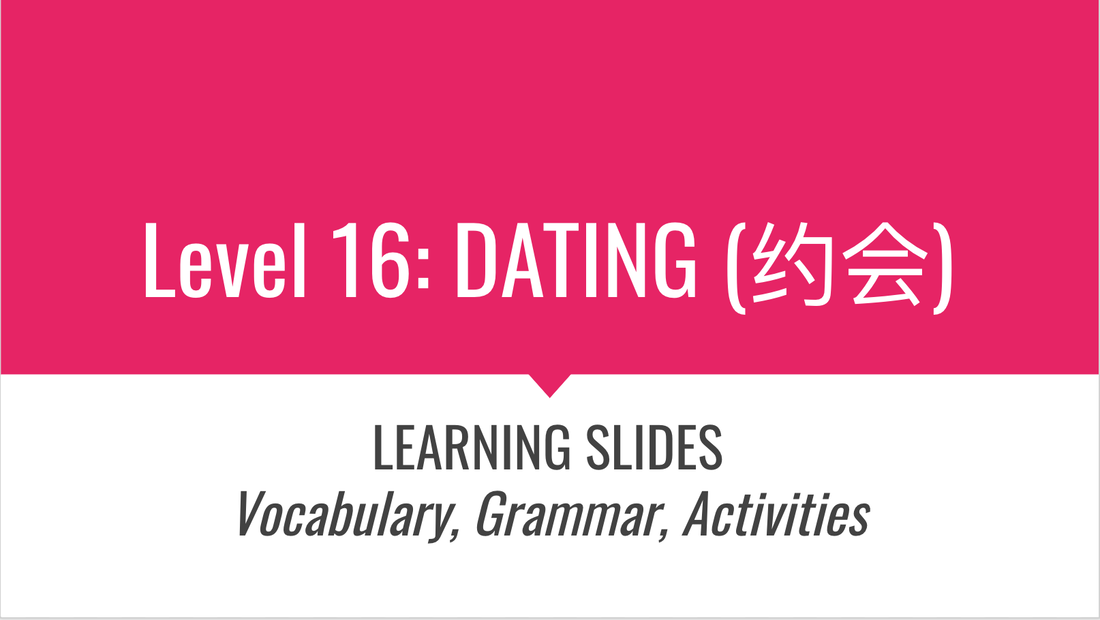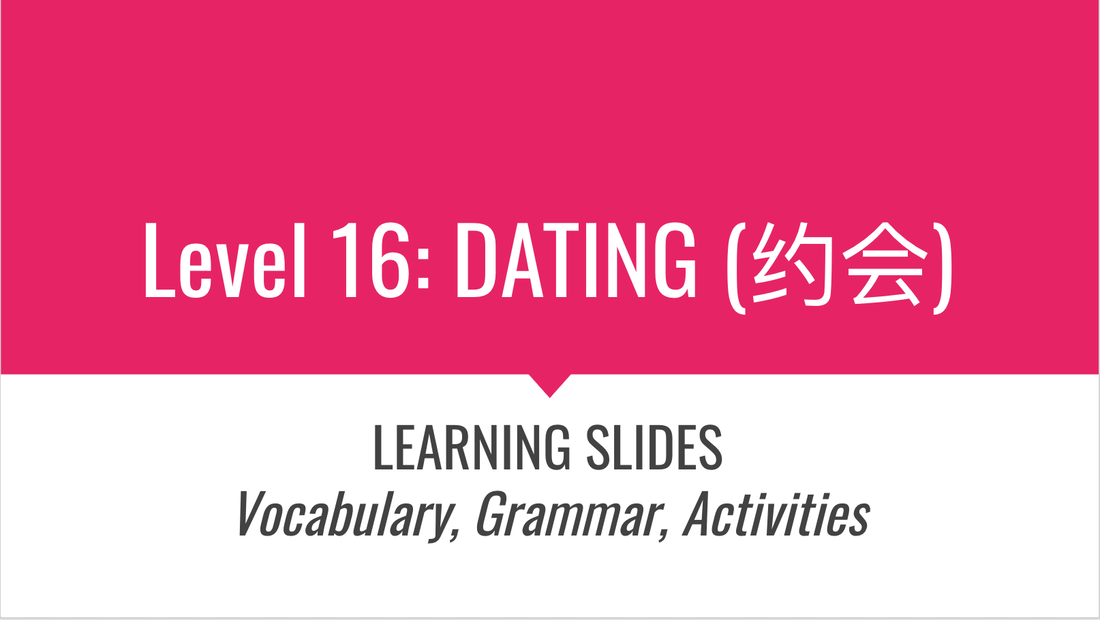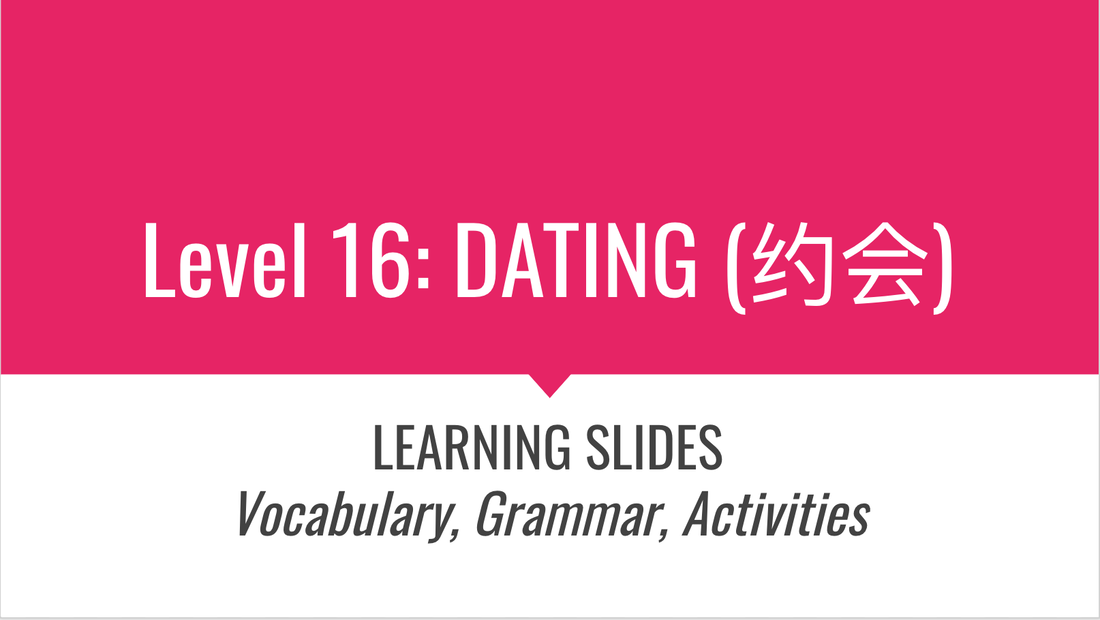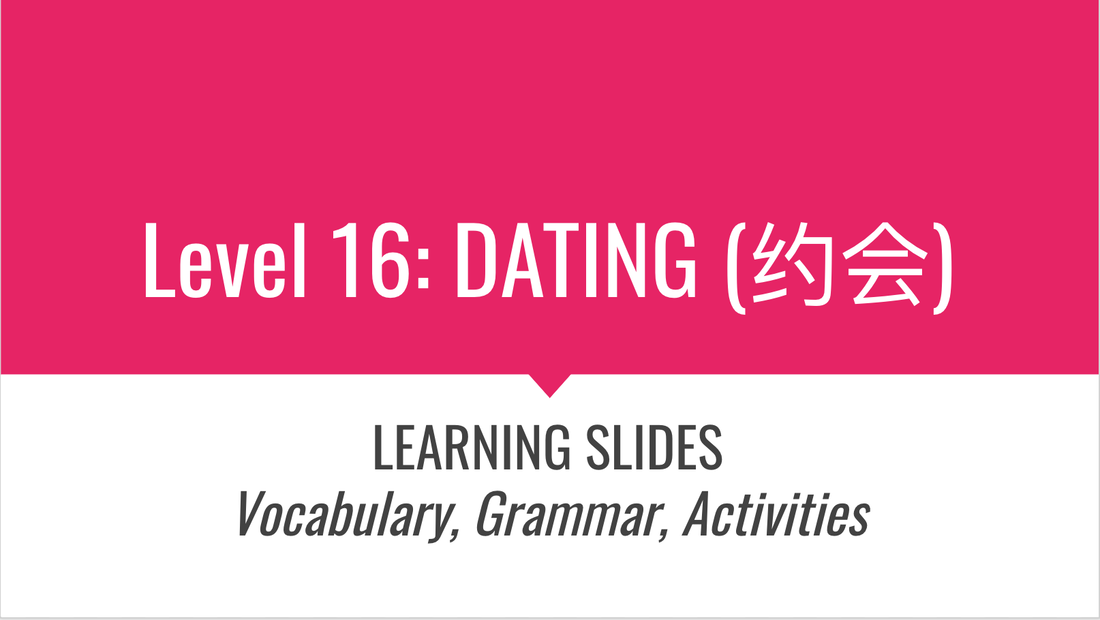Chapter 1: "Vampire Impressions"
HOW TO TALK ABOUT GOOD IMPRESSIONS
Preview
Lesson
Practice
Mastery
Preview
|
|
谈恋爱 (tán liàn ài) [vo]; to date; dating
印象 (yìn xiàng) [n]; impression
A对B的印象很好 A has a good impression of B
A给B的印象很好 A made a good impression on B
手机 (shǒu jī) [n]; cell phone
号码 (hào mǎ) [n]; number
|
Lesson
Practice
TRAIN: write 3 sentences each using the following grammar structures:
SPEAK: discuss people who have left a good impression on you. Describe what they did to leave such a good impression.
WRITE: write a diary entry, describing a first date. What kind of impression did your date leave on you? Will you see him/her again? Why or why not?
- A对B的印象
- A给B的印象
SPEAK: discuss people who have left a good impression on you. Describe what they did to leave such a good impression.
WRITE: write a diary entry, describing a first date. What kind of impression did your date leave on you? Will you see him/her again? Why or why not?
Mastery
DICTATION: write the Chinese characters, English definition, and pinyin (including tones):
GRAMMAR: complete the following exercises:
READING: read aloud the following sentences:
SPEAKING: perform the following conversation tasks:
- 印象,手机,号码,谈恋爱
- TARGET: no more than 1 mistake, including tones.
GRAMMAR: complete the following exercises:
- Translate: Li You has a very good impression of Wang Peng.
- Puzzle: Convert the sentence "李友对王朋的印象很好" into the other form of the 印象 structure.
- TARGET: no mistakes.
READING: read aloud the following sentences:
- 李友对王朋的印象很好,王朋也很喜欢李友。
- 高先生,对不起,你的手机... 没有了!
- 是吗?你是怎么知道我的电话号码的?
- 王朋和李友谈恋爱了。
- TARGET: no more than 1 mistake, including tones.
SPEAKING: perform the following conversation tasks:
- Talk about your impressions of different people and places.
- Talk about cell phone numbers.
- TARGET: at least a 3 on ALL tasks.
Chapter 2: "Hit Movie"
HOW TO TALK ABOUT GOING TO THE MOVIES
Preview
Lesson
Practice
Mastery
Preview
演 (yǎn) [v]; to show (a film); to perform
票 (piào) [n]; ticket
买得到 (mǎi de dào) [vc]; can be bought
买不到 (mǎi bù dào) [vc]; can't be bought
Potential Complements:
得(de)or 不(bù)is placed between a verb and a resultative or directional complement to express the possibility of achieving an expected action.
Examples:
- 演电影=to show a film
- 这个周末学校演一个中国电影,我们一起去看,好吗?
票 (piào) [n]; ticket
- [X] + 票, i.e. 飞机票,地铁票
- 电影票=movie ticket
- 好啊!不过,听说看电影的人很多,买得到票吗?
买得到 (mǎi de dào) [vc]; can be bought
- 买=verb,得=potential complement,到=result complement
- 买得到票= tickets can be bought
- 好啊!不过,听说看电影的人很多,买得到票吗?
买不到 (mǎi bù dào) [vc]; can't be bought
- 买=verb,不=potential complement,到=result complement
- 买不到票 = tickets can’t be bought
Potential Complements:
得(de)or 不(bù)is placed between a verb and a resultative or directional complement to express the possibility of achieving an expected action.
- STRUCTURE: “ verb + 得/不 + result or direction complement”
- Remember: a complement is a word or phrase following a verb (or sometimes an adjective) that provides additional meaning to the verb phrase. There are many different types of complements. Complements can describe duration, quantity, state, degree, result, direction, or possibility.
- NOTE 1: Potential forms most commonly occur in negative statements. Affirmative statements using the potential form are somewhat uncommon, and, when they do occur, are usually answers to questions (or as rebuttals).
- NOTE 2: Putting 得 or 不 between an action verb and a result complement or direction complement changes them to potential complements.
- For more details about potential complements, see this link.
Examples:
- 跳舞太难,我学不会。= Dancing is too difficult. I can’t learn it.
- 我得开会,六点半回不来。= I have a meeting, can’t make it back by 6:30 PM.
- 这张碟我今天看不完。= I can’t finish watching this DVD today.
- 我看得懂。= Yes, I can understand it.
- 今天的功课很多,你做得完吗?= There is too much homework today. I can’t finish it.
Lesson
Practice
TRAIN: write 3 sentences each using each type of potential complement:
WRITE: write a diary entry, describing a recent date where you attempted to go to the movie theater. However, you were unable to buy tickets to the movie you wanted to see.
SKIT: in a group, write a dialogue about going on a date to see a movie. Memorize your skit and perform in front of the class!
- verb + 得 + result or direction complement
- verb + 不 + result or direction complement
WRITE: write a diary entry, describing a recent date where you attempted to go to the movie theater. However, you were unable to buy tickets to the movie you wanted to see.
SKIT: in a group, write a dialogue about going on a date to see a movie. Memorize your skit and perform in front of the class!
Mastery
DICTATION: write the Chinese characters, English definition, and pinyin (including tones):
GRAMMAR: complete the following exercises:
READING: read aloud the following sentences:
SPEAKING: perform the following conversation tasks:
- 买得到,买不到,演,票
- TARGET: no more than 1 mistake, including tones.
GRAMMAR: complete the following exercises:
- Rule (in English): explain what a "potential complement" is. Describe its structure. Give examples of potential complements.
- Rule (in English): Describe the relationship between a potential and a result/direction complement.
- Translate: I hear that many people are going to see that film. Will we be able to get tickets? [Potential Complement]
- Translate: I'm not able to hear to understand it. [Potential Complement]
- TARGET: no more than 2 grammar mistakes.
READING: read aloud the following sentences:
- 这个周末学校演一个中国电影,我们一起去看,好吗?
- 好啊!不过,听说看电影的人很多,买得到票吗?
- 买不到票。
- TARGET: no more than 1 mistake, including tones.
SPEAKING: perform the following conversation tasks:
- Talk about going to see a movie.
- Talk about buying movie tickets.
- Talk about the possibility (or impossibility) of different actions.
- TARGET: at least a 3 on ALL tasks.
Chapter 3: "Save the Date"
HOW TO ACCEPT A DATE COURTEOUSLY
Preview
Lesson
Practice
Mastery
Preview
|
|
后天 (hòu tiān) [t]; the day after tomorrow
一言为定 (yì yán wéi dìng) [成语]; that settles it, it's decided (lit: "one word to decide")
好好儿+verb (hǎo hǎo er) [adv]; all out, to one's heart's content
|
Lesson
Practice
WRITE: write a letter in response to a secret admirer, who has proposed to reveal his/her identity to you...on a date. You've decided to accept the date, courteously. You even have suggestions for place/time/activity.
SKIT: in a group, write a dialogue about going on a date to see a movie. Memorize your skit and perform in front of the class!
SKIT: in a group, write a dialogue about going on a date to see a movie. Memorize your skit and perform in front of the class!
- Person A asks Person B out on a date
- After Person B accepts, they schedule the date.
Mastery
DICTATION: write the Chinese characters, English definition, and pinyin (including tones):
READING: read aloud the following sentences:
SPEAKING: perform the following role-play:
- 后天,一言为定,好好儿
- TARGET: no more than 1 mistake, including tones.
READING: read aloud the following sentences:
- 后天晚上八点(看电影)。
- 看电影以前,我请你吃晚饭。
- 太好了!一言为定。
- 你考完试,我们好好儿玩儿玩儿。
- TARGET: no more than 1 mistake, including tones.
SPEAKING: perform the following role-play:
- PERSON #1:
- Ask Person 2 on a date for the day after tomorrow.
- Explain what you will do on the date and why.
- After Person 2 accepts, exclaim "it's settled!"
- PERSON #2:
- Ask Person 1 questions about this date.
- Accept and exclaim, "it's settled!"
- TARGET: at least a 3 on ALL tasks.
Chapter 4: "Meet the Werewolf"
HOW TO TALK ABOUT REMEMBERING THINGS
Preview
Lesson
Practice
Mastery
Preview
同 (tóng) [adj]; same, alike
记得 (jì de) [v]; to remember
想起来 (xiǎng qi lai) [vc]; to remember; to recall
想不起来 (xiǎng bù qi lai) [vc]; can't remember, can't recall
记得 vs. 想起来:
Direction Complements:
A "direction complement" is a complement that's used to describe the direction of a verb.
STRUCTURE: "VERB + DIRECTION COMPLEMENT"
- 王朋跟李友在同一个学校学习,他们认识已经快半年了。
记得 (jì de) [v]; to remember
- 你还记得我吗?
想起来 (xiǎng qi lai) [vc]; to remember; to recall
- 想=verb,起来=“abstract” compound directional complement
- Compound directional complements are quite complicated. See below.
- For our purposes, remember that “起来” = a movement from a lower point to a higher point.
- 想起来 literally means “to think it up”
- 你再想想。想起来了吗?
想不起来 (xiǎng bù qi lai) [vc]; can't remember, can't recall
- 想=verb,不=negative, 起来= compound directional complement
- 想不起来 literally means “to can’t think it up”
- 对不起,我想不起来。
记得 vs. 想起来:
- While 记得 pertains to the continuous state of remembering, 想起来 refers to the mental act of retrieving information from one’s memory.
- 我记得他上过我的课,可是我想不起来他叫什么名字 = I do remember he took my class, but I can’t think of his name at the moment.
Direction Complements:
A "direction complement" is a complement that's used to describe the direction of a verb.
- A complement is a word or phrase following a verb (or sometimes an adjective) that provides additional meaning to the verb phrase. There are many different types of complements.
- Simple direction complements include 上,下,近,起,开,来 (signifying movement toward the speaker),去 (signifying movement away from the speaker), etc.
- Compound direction complements are made of two simple direction complements (either 来 or 去 is always in the second part of the compound). Examples include 上去,上来,进去,回来,etc.
- Compound direction complements are used in the same way as 来 and 去. Attach them to verbs to give detail about the direction of the action.
- NOTE: Direction complements are often combined with the "把" structure, especially when the sentence takes an object.
- For more details about direction complements, see this link.
STRUCTURE: "VERB + DIRECTION COMPLEMENT"
- Simple Direction Complements:
- Subject + Verb +来/去+ (Object)
- 他买来了一些水果。= He bought some fruit (and brought it toward the speaker).
- Subject + Verb + (Object) + 来/去
- 请你买 一些水果来。= Please buy some fruit [and bring it] here.
- 他下楼来。= He comes downstairs (toward the speaker).
- Subject + Verb +来/去+ (Object)
- Compound Direction Complements:
- Subject + Verb + Direction Verb + (Object) + 来/去
- 他坐下来。= He sits down (toward the speaker).
- 他走进来。= He walks inside (toward the speaker).
- 她走下楼来。= She walks downstairs (toward the speaker).
- 弟弟跳上床去。= My little brother jumps onto the bed (away from the speaker).
- 老师走进教室去。= The teacher walks into the classroom (away from the speaker).
- 她坐飞机回去 。= He rides an airplane back there (away from the speaker).
- 请大家都拿起笔来。= Everyone please pick up a pen [起来=abstract direction].
- Subject + Verb + Direction Verb + (Object) + 来/去
- Direction Complements with "把":
- Subject + 把 + Object + Verb + 来/去 [Simple Direction Complement]
- 请把你的床搬来。= Please move your bed here (toward the speaker).
- 把这杯冰茶拿去。= Take this glass of iced tea [away with you].
- Subject + 把 + Object + Verb + Direction Verb + 来/去 [Compound Direction Complement]
- 快把车开回家去。= Quick, drive the car back home (away from the speaker).
- 我把书拿起来了。I picked up the book [起来=abstract direction].
- Subject + 把 + Object + Verb + 来/去 [Simple Direction Complement]
Lesson
Practice
TRAIN: Write 3 sentences for each of the following grammar structures, demonstrating your understanding of the distinctions between them:
SPEAK: discuss things you can easily recall, as well as things you can't easily recall.
WRITE: write a poem having to do with remembering and/or forgetting things.
- 想起来
- 想得起来
- 想不起来
SPEAK: discuss things you can easily recall, as well as things you can't easily recall.
WRITE: write a poem having to do with remembering and/or forgetting things.
Mastery
DICTATION: write the Chinese characters, English definition, and pinyin (including tones):
GRAMMAR: complete the following exercises:
READING: read aloud the following sentences:
SPEAKING: perform the following conversation tasks:
- 记得,想起来,想得起来,同
- TARGET: no more than 1 mistake, including tones.
GRAMMAR: complete the following exercises:
- Rule (in English): Explain what a "simple direction complement" is. Give examples.
- Rule (in English): Explain what a "compound direction complement" is. Give examples.
- Rule (in English): Explain the relationship between "把" and direction complements.
- Detective (find and fix the mistakes): 老师走进去教室。
- Rule (in English): explain the differences between 想起来 vs. 记得. Give examples of each usage in context.
- Rule (in English): Explain the structure of "...起来," and at least one way to use it. Give examples.
- BONUS: Explain both ways to use "...起来" that we've learned so far.
- Translate: Think again. Do you recall now? [Abstract Direction Complement]
- Translate: I'm sorry. I can't recall. [Potential Complement]
- BONUS (Translate): I do remember he took my class, but I can't recall his name.
- TARGET: no more than 3 grammar mistakes.
READING: read aloud the following sentences:
- 你还记得我吗?
- 你再想想。想起来了吗?
- 对不起,我想不起来。
- 王朋跟李友在同一个学校学习,他们认识已经快半年了。
- TARGET: no more than 1 mistake, including tones.
SPEAKING: perform the following conversation tasks:
- Talk about remembering things.
- Talk about recalling things in the moment.
- Talk about things that you share in common.
- TARGET: at least a 3 on ALL tasks.
MINIBOSS #1: ACT 1 REVIEWMastery Challenge 1 (Vocabulary and Grammar):
Mastery Challenge 2 (Speaking):
BONUS CHALLENGES:
|
© 2019 Hugo Xiong. [email protected]








